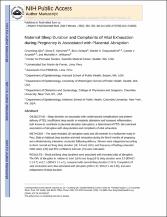Maternal sleep duration and complaints of vital exhaustion during pregnancy is associated with placental abruption

View/Open
Trabajo
(application/pdf: 202.1Kb)
(application/pdf: 202.1Kb)
Date
2015-02Author(s)
Qiu, Chunfang
Sanchez, Sixto E.
Gelaye, Bizu
Enquobahrie, Daniel A.
Ananth, Cande V.
Williams, Michelle A.
Metadata
Show full item recordAbstract
OBJECTIVE
Sleep disorders are associated with cardiovascular complications and preterm delivery (PTD). Insufficient sleep results in metabolic alterations and increased inflammation, both known to contribute to placental abruption (abruption), a determinant of PTD. We examined associations of abruption with sleep duration and complaints of vital exhaustion.
METHODS
The study included 164 abruption cases and 160 controls in a multicenter study in Peru. Data on habitual sleep duration and vital exhaustion during the first 6 months of pregnancy were elicited during interviews conducted following delivery. Women were categorized according to short, normal and long sleep duration (≤6, 7-8 and ≥9 h); and frequency of feeling exhausted. Odds ratios (OR) and 95% confidence intervals (CI) were calculated.
RESULTS
Short and long sleep durations were associated with increased odds of abruption. The ORs of abruption in relation to short (≤6 h) and long (≥9 h) sleep duration were 2.0 (95%CI 1.1-3.7) and 2.1 (95%CI 1.1-4.1), compared with normal sleep duration (7-8 h). Complaints of vital exhaustion were also associated with abruption (OR=2.37; 95%CI 1.46-3.85), and were independent of sleep duration.
CONCLUSION
We extend the existing literature and support the thesis that maternal sleep habits and disorders should be assessed among pregnant women.
Collections
- Artículos [274]
Publisher
Informa Healthcare
Rights
info:eu-repo/semantics/openAccess
Funding
National Institutes of Health (NIH), National Institute on Minority Health and Health Disparities (T37-MD001449).
Eunice Kennedy Shriver National Institute of Child Health and Human Development (R01-HD-059835; R01-HD-059827).







